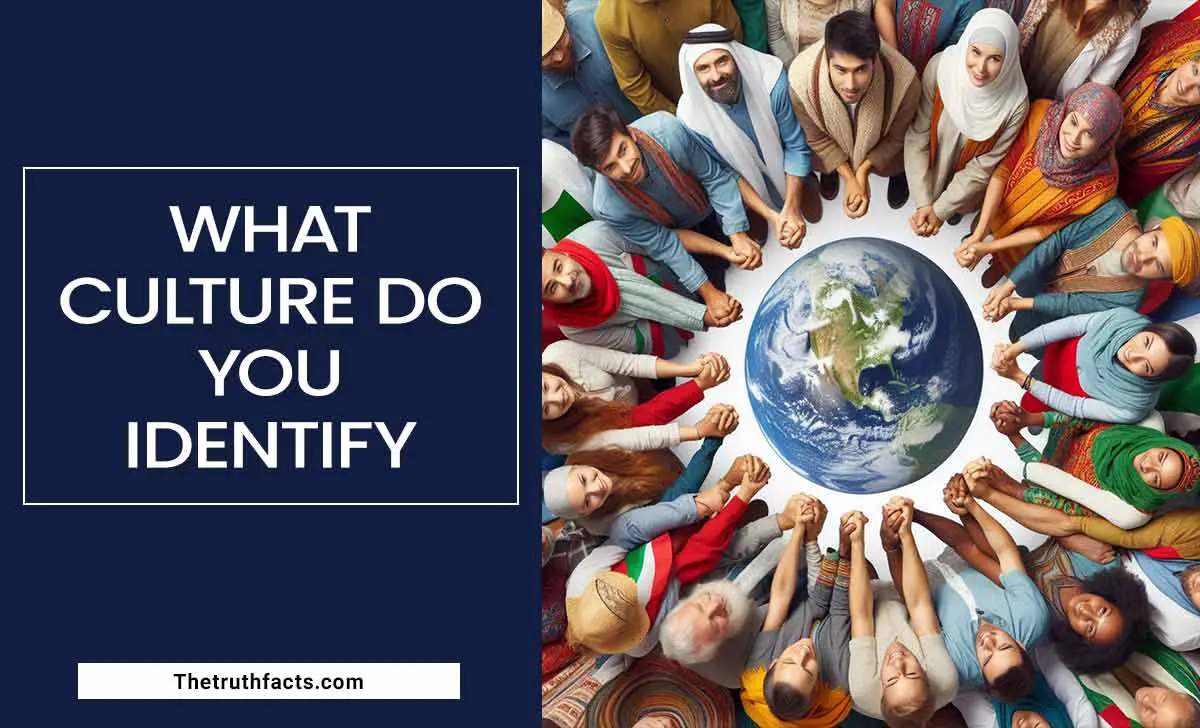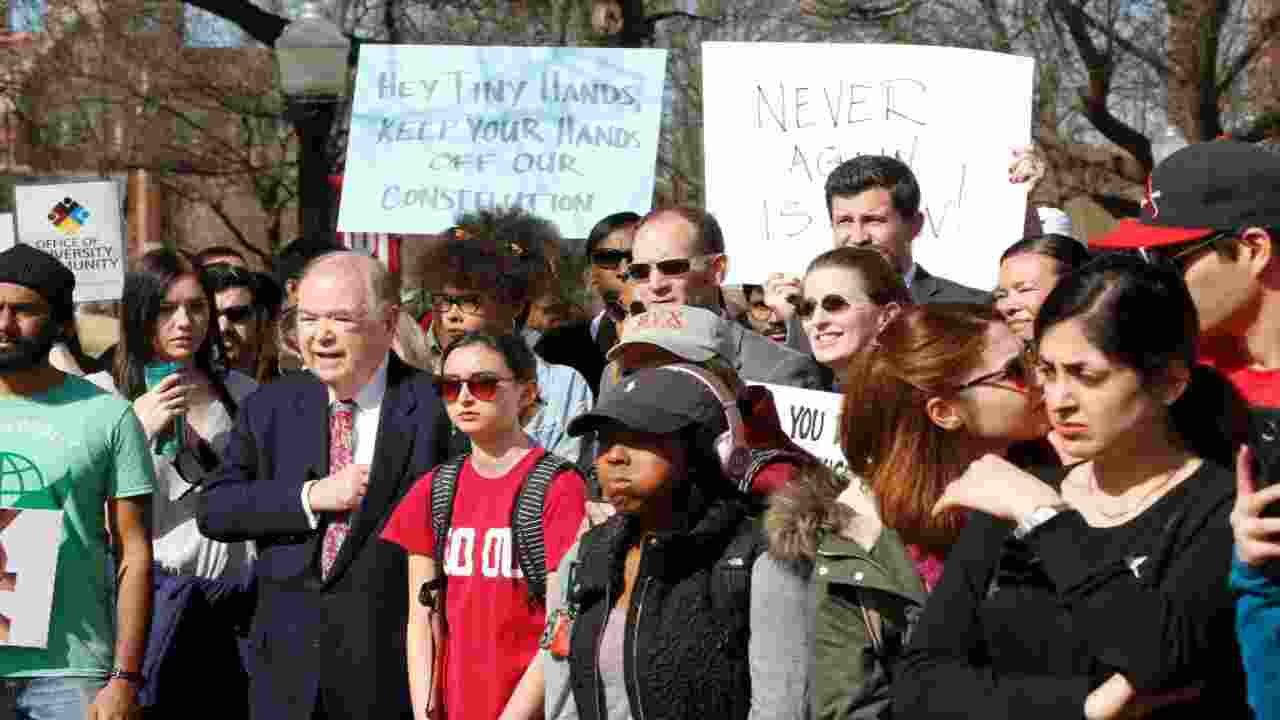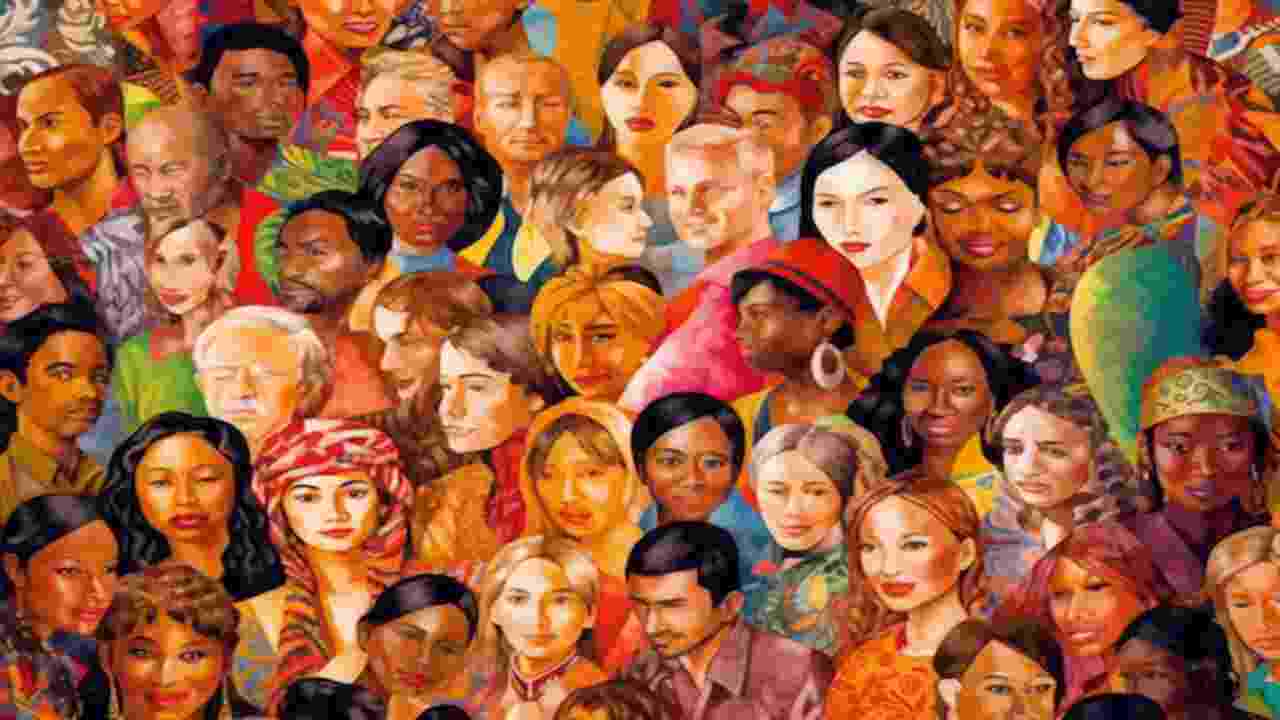Culture plays a significant role in shaping our identities. It encompasses various beliefs, values, customs, and traditions that a particular group shares. From the English language and food to music and art, culture permeates every aspect of our lives, influencing how we perceive and interact with the world.
As such, it is no surprise that the question “What aspects of culture do you identify with?” can elicit a wide range of responses. Some may immediately think of their ethnic or national identity culture, while others may identify with a subculture or a community based on shared interests or beliefs.
Here, we will explore the complexities of the cultural sense of identity and the importance of understanding and embracing one’s own cultural norms and identities. We will delve into the various factors influencing our cultural identities and how they can shape our perceptions, behaviours, and relationships.

What Culture Do You Identify With – Cultural Origins

Culture plays a pivotal role in shaping our identities and how we perceive the world around us. It encompasses various elements such as language, customs, traditions, beliefs, and values passed down from generation to generation. We often find ourselves reflecting on the question, “Which culture do you identify with?” Identifying with a particular culture is a deeply personal and subjective experience.
It is a process that involves introspection and self-reflection as we explore our unique backgrounds and experiences. Some individuals may identify strongly with the culture they were born into, embracing the customs and traditions ingrained in their lives since childhood. Others may be drawn to a different culture through exposure to diverse communities or personal exploration.
Ways To Identify Culture

Culture can be identified in many ways, but one of the most common is to look at how people dress, what they enjoy reading, and what music they listen to. Other examples of identifying culture include how people handle money, their attitudes towards work, and their social interactions.
Overall, it is important to remember that culture is fluid – it changes over time and often depends on the individuals within a given society. That being said, some general trends can be observed regarding culture – for example, there tends to be more conformity in more hierarchical societies. So, if you want to identify and understand the culture of a given society or region, it is important to pay attention to the way its citizens dress, act, and speak.+
How We Identify Ourselves?

It is hard to see what you are when your culture seems so out of reach. One can’t say they’re from this or that country because their culture is a culmination of the ones they’ve been exposed to and have grown up with.
How do you identify yourself, There’s no need to feel helpless; there are ways to find yourself! It may be difficult at first, but once you realize who you are, it will be worth all the effort. There are a few ways in which one can identify themselves:
A) Personal Background

Our personal background plays a significant role in how we identify ourselves. It encompasses various aspects such as our cultural heritage, family traditions, and upbringing. These factors shape our beliefs, values, and perspectives, ultimately influencing our sense of self.
For some individuals, their personal background may be closely tied to their ethnicity or nationality. While for others it may be more focused on their family dynamics or socioeconomic status. Regardless of the specific elements that make up our personal background, it is an integral part of who we are and how we perceive ourselves in the world.
B) Cultural Exhibits
Cultural exhibits play a significant role in how we identify ourselves. These exhibits showcase the diverse range of cultures that exist in the world and allow us to learn about different traditions, customs, and values. By experiencing cultural exhibits, we are exposed to new ideas and perspectives which can broaden our understanding of ourselves and others.
They provide an opportunity for individuals to connect with their own heritage, as well as gain appreciation for other cultures. Cultural exhibits also promote inclusivity and diversity, highlighting the importance of embracing our differences and celebrating the richness of human culture.
C) Find Others Like Yourself
One important aspect is finding others who are similar to us. Whether it’s based on shared interests, values, or experiences, connecting with like-minded individuals can provide a sense of belonging and validation. This can be especially true for individuals who may feel marginalized or misunderstood.
Finding others like yourself can help you feel seen and heard, and can also provide opportunities for personal growth and learning. Whether it’s through online communities, support groups, or social events, seeking out and connecting with others who share your identity can be an important part of self-discovery and self-acceptance.
D) Travel

This is the ultimate way to understand yourself and who you are as a person: travel around countries and learn about their culture. It doesn’t matter how long it takes; the important thing is that you do it because once you open up your mind to new places, people, and ways of living, all things will fall into place.
Exploring different cultures and their unique characteristics
When it comes to cultural identity, there are countless diverse cultures around the world, each with its own unique characteristics. Here are some examples of different cultures and their distinctive features. Exploring different cultures can broaden your perspective and deepen your understanding of the world we live in.
- Japanese Culture: Known for its emphasis on respect, harmony, and discipline. Traditional practices such as tea ceremonies and martial arts are deeply rooted in Japanese society.
- Indian culture: Celebrated for its vibrant festivals, delicious cuisine, and rich history. The caste system and arranged marriages are important aspects of Indian culture.
- African culture: Diverse in its traditions, languages, and customs across the continent. African music, dance, and art have greatly influenced global culture.
- Chinese culture: Renowned for its ancient philosophy, such as Confucianism and Taoism. Chinese cuisine, calligraphy, and traditional medicine are also highly regarded worldwide.
- Indigenous cultures: Indigenous peoples around the globe have unique languages, spirituality, and sustainable
The Importance Of Cultural Identity In Personal Development
Cultural identity plays a crucial role in personal development. It shapes our sense of self and provides us with a sense of belonging and purpose. Understanding and embracing our cultural heritage can help us navigate through life with a greater sense of confidence and pride. It allows us to connect with others who share similar values and traditions, fostering a sense of community and support.
Moreover, cultural identity gives us a unique perspective on the world, enabling us to appreciate diversity and foster inclusivity. By recognizing the importance of cultural identity in personal development, we can cultivate a deeper understanding of ourselves and others, ultimately leading to personal growth and fulfilment.
Tips For Navigating Between Multiple Cultural Identities

Navigating between multiple cultural identities can be a complex and sometimes challenging experience. Here are some tips to help you navigate this journey. Remember, navigating multiple cultural identities is a lifelong journey of self-discovery and growth. Embrace the diversity within yourself and use it as an opportunity to connect with others and create a more inclusive world.
- Embrace Your Unique Identity: Each person’s cultural background is unique and valuable. Embrace all aspects of your identity and celebrate the richness that comes from having multiple cultures.
- Educate Yourself: Take the time to learn about each culture you identify with. Understand their customs, traditions, and values. This knowledge will help you navigate between different cultural contexts with respect and understanding.
- Seek Support From Others: Connect with individuals who share similar cultural backgrounds or who have also navigated multiple cultural identities. They can provide guidance, support, and a sense of belonging.
- Find Common Ground: Look for the similarities between your different cultures rather than focusing on the differences. This can help you find connections and bridge gaps between cultures.
- Communicate Openly: Be open and honest about your cultural background with others. Share your experiences, perspectives, and challenges to foster understanding and promote dialogue.
Find Others Like Yourself
Online communities can be an excellent resource when self-exploration is what you’re trying to do. Finding others who came from the same places as you and shared your interests will help your search for identity. One of the key advantages of online communities is the ability to find individuals who have gone through similar experiences.
Whether growing up in a particular cultural or socioeconomic background or pursuing a unique passion or interest, these communities bring together people who can relate to one another’s stories and experiences.
Cultural Assimilation

The world isn’t ethnocentric because it’s something people want; it’s because they don’t know any better. This is why we need to spread the idea that it doesn’t matter where you’re from. What matters is how you live and who you are as a British person. Never forget about who you are, where you come from, and how this will help others accept themselves more easily. That way, perhaps there won’t be such a strong barrier between us and the rest of the world in the future.
Ethnocentrism
Ethnocentrism is a big part of what we’re struggling against. We are ethnocentric in that way because it makes us feel safe and secure, but the only problem is that other people don’t feel the same. Cultural assimilation, therefore, becomes inevitable.
We need to change this aspect of our society. It’s not that we don’t want other cultures; we feel threatened by them. But when we try to integrate with others and compare ourselves to them on equal ground, the world becomes an experiment rather than a threat.
The Importance Of Intercultural Communication
We all have something special about us, whether from our family or who knows where else! Some people seem like they belong everywhere. Suppose you’re one of those people, lucky you! If that isn’t your situation, identify yourself through your roots so you can be proud of being yourself and others simultaneously. People are afraid to talk about their culture because they fear they
Exemplification Of The Importance Of Cultural Identity

Cultural identity refers to the sense of belonging and identification with a particular culture or group. It encompasses various aspects such as language, customs, traditions, values, and beliefs that shape an individual’s unique identity. Here are some key points highlighting the importance of cultural identity:
- Preservation Of Heritage: Cultural identity plays a crucial role in preserving and passing down traditions, rituals, and historical knowledge from one generation to another. It helps maintain a sense of continuity and connection to the past.
- Individual Identity And Self-Expression: Cultural identity provides a framework for individuals to express their values, beliefs, and experiences. It helps shape personal identity, allowing individuals to understand who they are and where they come from.
- Building Social Cohesion: Cultural identity fosters a sense of belonging and unity among individuals with common cultural backgrounds. It can strengthen community social bonds, promoting cooperation, understanding, and mutual support.
- Cultural Diversity And Global Understanding: Cultural identity celebrates diversity and promotes cross-cultural understanding. It encourages respect and appreciation for different perspectives, enhancing global awareness and fostering harmonious relationships among diverse groups.
- Psychological Well-Being: A strong cultural identity can contribute to an individual’s psychological well-being. It provides a sense of pride, belonging, and purpose, which can positively impact mental health and overall life satisfaction.
- Economic And Tourism Potential: Cultural identity can serve as a valuable economic resource, attracting tourists, promoting cultural tourism, and contributing to local economies.
Conclusion
Identifying with a particular culture is a personal and complex experience. It is important to recognize that culture is not static and can evolve and change over time. By understanding and embracing our cultural identities, we can better understand ourselves and the world around us.
Whether we identify with one culture or multiple, our cultural backgrounds shape and inform our perspectives, beliefs, and values. It is important to respect and celebrate the diversity of American culture within our society, as it is a beautiful and integral part of what makes us human. Embracing and honouring our cultural identities can lead to greater empathy, understanding, and unity in our global community.
FAQ:
What Does It Mean To Identify With Your Culture?
Identifying with your type of culture means feeling a strong sense of connection and belonging to the traditions, values, customs, and history of your group or community.
What Is An Example Of A Cultural Identity?
An example of a cultural identity is being part of a specific ethnic group, such as identifying as African American identity, Asian, Hispanic, or Native American.
How Do You Answer What Is Your Culture?
My Chinese culture combines my experience, background, beliefs, traditions, and values shaped by my family, community, and experiences throughout my life.
What Are The 4 Cultural Identifiers That You Identify With Most?
Cultural identifiers can vary widely depending on an individual’s background and experiences. Some common examples might include nationality, ethnicity, language, and religion.
What Are The Big 8 Cultural Identifiers?
The Big 8 cultural identifiers are a framework for understanding and analyzing cultural diversity. They include race, ethnicity, gender, sexual orientation, socioeconomic status, age, disability, and religion.

I’m a writer and blogger who loves to talk about entertainment, culture, and relationships. I love to share my thoughts and insights on these topics, and I’m always looking for new ways to engage with my readers. I’m also a big fan of learning new things, so I’m always exploring new areas of interest.
